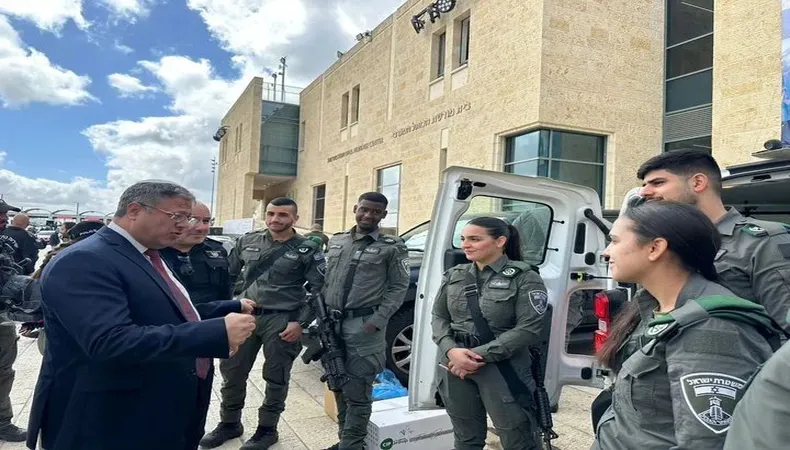Far-Right Israeli Minister Itamar Ben-Gvir Seeks to Derail Gaza Cease-Fire Negotiations

Officially expressing his intention to stop ongoing discussions between Israel and Hamas on a cease-fire and prisoner swap, Israeli National Security Minister Itamar Ben-Gvir has clearly aggravated the already unstable situation in Gaza. Known for his strong views, Ben-Gvir said on Wednesday on his X page, “I’m acting to halt negotiations with Hamas.” This comment aligns with Israel’s military activities in Gaza growing aggressiveness and international attempts to arbitrate peace in face of significant obstacles.
A Hardline Reaction: Retaliation Against Diplomacy
Ben-Gvir’s reaction to the Gaza situation reflects his more general conviction that vengeance comes first over diplomatic considerations. His engagement in the cease-fire negotiations aligns with the latest discovery of six Israeli hostages dead from southern Gaza. Although Israeli officials have claimed Hamas killed these hostages, the Palestinian group claims Israeli strikes resulted in death.
“A country whose six hostages are murdered in cold blood does not negotiate with the murderers but stops the negotiations, stops the transferring to them fuel and electricity and crushes them,” Ben-Gvir declared in response to these events. This comment underlines his belief that Israel should not only halt negotiations but also increase its military and financial pressure on Hamas.
Internal Strife: Emerging Conflicts inside the Israeli Government
Ben-Gvir’s strict posture has especially caused friction inside the Israeli government, especially with Prime Minister Benjamin Netanyahu. As Netanyahu battles the complexities of administering a protracted conflict, he is under more and more criticism from both inside his cabinet and from the public.
Ben-Gvir has continuously threatened to destroy Netanyahu’s coalition should any cease-fire agreement with Hamas be reached, therefore complicating the Prime Minister’s efforts to mediate the ongoing crisis. This inner struggle highlights how progressively fragmented Israeli politics is, in which the balance between military action and diplomatic negotiations is a difficult issue.
The Hostage Crisis: A Conflict Catalyzer
The essence of the current issue is defined by the plight of about 100 Israeli hostages still under detention by Hamas in Gaza. The ongoing hostage issue has been a main source of friction in the negotiations on the cease-fire. Israeli officials find it difficult to move with negotiations even if some of the prisoners are believed to have passed death. Their destiny is yet undetermined.
The differing accounts of the events surrounding the six hostages recently released from Gaza—whether they were killed in Israeli attacks or murdered by Hamas—have added to the complexity of the case. Ben-Gvir’s opposition to talks under these conditions derives from his belief that Israel should not provide any indication of preparedness to engage with Hamas as long as Israeli life remains in danger.
Stalled Glob Mediation Efforts
Months of trying have gone toward setting a cease-fire between Israel and Hamas by international mediators from Egypt, Qatar, and the United States among others. These programs also aim to ensure a prisoner swap and provide humanitarian help to Gaza, where fast worsening conditions need it. However, these mediation efforts have run against primarily linked challenges of Netanyahu’s inability to meet Hamas’s demands to end the violence. The deadlock in negotiations highlights the rooted antagonism and rigidity on both sides, therefore complicating the process of finding a road to peace.
Humanitarian Disaster in Gaza: Cost of Constant Conflict
Gaza’s situation has been increasingly dire as Israel maintains its aggressive operations under progress. Following the October 7 Hamas strike, Israel has launched a relentless campaign causing extensive damage and a major humanitarian crisis. Notwithstanding a UN Security Council ruling calling for an immediate cease-fire, Israel has kept on with its military activities. The Palestinian death toll has surged to around 40,800 mostly from women and children. The ongoing blockage has worsened the situation and caused major shortages of food, drinkable water, and medication; approximately 94,300 people have been injured. Most of Gaza is in ruins these days; whole communities have been reduced to rubble and daily worsening humanitarian conditions result.
Genocide Allegations and Legal Arguments from Other Countries
Activities of Israel in Gaza have drawn accusations of universal denunciation and genocide. Israel faces serious legal challenges abroad while the International Court of Justice (ICJ) now analyzes the subject. The enormous numbers of civilian deaths and the degree of devastation in Gaza have heightened calls for justice and responsibility. The world community is still quite divided on how to manage the crisis; some countries advocate more severe sanctions against Israel while others underline the need of a peaceful settlement to cease the carnage.
Beyond the close proximity, the conflict between Israel and Hamas affects much more. Israel’s relations to its neighbors have suffered and Middle Eastern tensions have been generally heightened by the ongoing slaughter. The humanitarian situation in Gaza has also inspired demonstrations and protests all around as many advocate a more fair settlement of the Israeli-Palestinian conflict and an end to the slaughter. As the crisis unfolds, it is increasingly clear that the conflict is not just local but also global with the capacity to influence geopolitics moving ahead and alter world relations.
Ben-Gvir’s attempt to halt conversations on a cease-fire draws attention to the great disparities inside Israel and the more general challenges in bringing the war to an end with Hamas. As Israel continues running its military campaign and international mediation efforts stall, the path to peace is yet undetermined. The following weeks will be crucial in determining whether a cease-fire can be attained or whether the violence would escalate and would have terrible consequences on Palestinians as well as Israelis.




